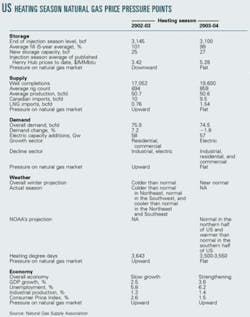NGSA: US gas supplies may be tight during heating season
There continues to be a tight balance between supply and demand in the US natural gas market, which could mean higher fuel costs for consumers this winter, the Natural Gas Supply Association (NGSA) said Oct. 3 in its third annual winter outlook for the 2003-04 heating season.
"Certainly, fears of a major upheaval in the marketplace have eased due to the very strong recovery this summer of natural gas inventories, but that doesn't mean we're 'out of the woods' in terms of supply costs," said NGSA Chairman William L. Transier.
NGSA stressed that it does not project actual cost figures for wholesale or retail markets. But when analyzing publicly reported pricing data, the group said it expects to see the same kind of pressure points that influenced last year's market. These include weather, the economy, storage, and production.
"That means the scenario has changed very little from last winter, when we experienced a dramatic increase in both consumer demand and average wholesale costs, due to colder temperatures than the prior heating season," Transier said. "The competitive market remains very vulnerable to the severity of the weather and the price volatility that a colder winter can bring."
NGSA said the government and independent analysts are predicting wholesale natural gas prices, now hovering about $4-5/Mcf, will continue at $4-6/Mcf throughout the US heating season, which starts Nov. 1. However, short-term price spikes in the wholesale futures markets remain a possibility, NGSA cautioned.
Transier also noted that while storage is likely to reach levels that are 99% of the average peak for the last 5 years, that supply will reenter the market this winter at higher-than-previous summer costs. To date, the injection season average of published spot market prices at Henry Hub is about $5.28/MMbtu.
NOAA forecast
NGSA found that the residential market appeared to be robust for winter, while the industrial market was weaker than normal.
NGSA cited a National Oceanic and Atmospheric Administration forecast for a near-normal heating season and predicted continued strong demand for home heating in the Mid-Atlantic, Northeast, and upper Midwest regions of the US.
Industrial demand was a different story. NGSA said that a strengthening "but still hesitant" economy means industrial demand is expected to be off somewhat, as manufacturers respond to the tight market conditions by conserving, suspending production, or switching fuels, NGSA said.
"Producers are responding aggressively to these ongoing market demands," said Transier, citing an independent estimate of season-to-season increases in both drilling rigs and well completions. "However, it's clear that we are working a lot harder just to maintain a steady supply. Even with these increases, production is expected to remain nearly flat, about 50.6 bcfd."
As in previous winters, additional heating season demand will be met by Canadian pipeline natural gas and LNG imports. Although gas from Canada is expected to be down slightly due to accelerating decline rates in existing wells, as in the US, that will be partially offset by an anticipated increase in LNG shipments from overseas.
Longer-term forecast
NGSA praised the Republican-led Congress for seeking to pass legislation aimed at encouraging more domestic production, calling it a step in the right direction.
"We are encouraged that Congress may soon pass a comprehensive energy bill, but it will not ease our long-term market constraints," Transier said. "More than 50% of the nation's undiscovered natural gas lies beneath nonpark government lands. An estimated 225 tcf of natural gas is prohibited from entering the market because of drilling moratoriums or extensive and costly permitting requirements.
"In the short run, policymakers must rely on the market for the most productive responses during the coming winter," Transier said. "NGSA remains committed, however, to focusing lawmakers and the Federal Energy Regulatory Commission on long-term supply solutions to ensure an adequate, reliable, and cost-effective supply of this clean-burning fuel for our nation's consumers."

